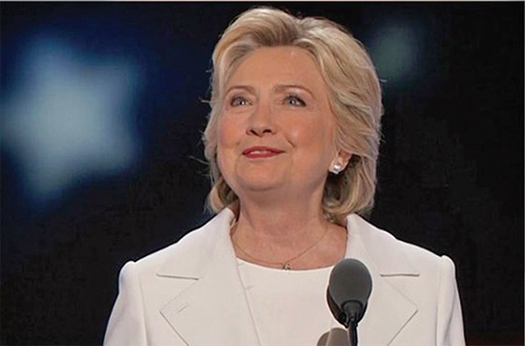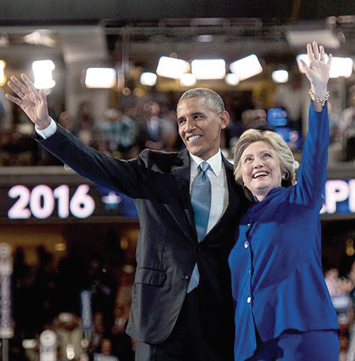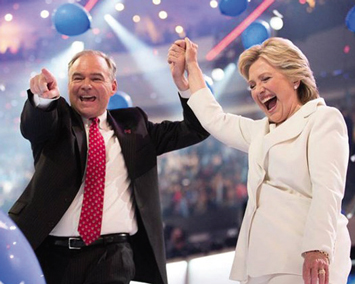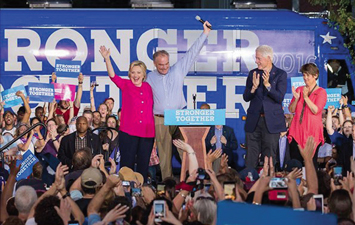Is Hillary Clinton offering help or hype?
By Askia Muhammad -Senior Editor- | Last updated: Aug 2, 2016 - 11:35:42 AMWhat's your opinion on this article?

Hillary Clinton gives a speech accepting her nomination as the Democratic Party’s candidate for President of the United States during the 2016 Democratic National Convention (DNC).
|
PHILADELPHIA— Former Secretary of State Hillary Clinton accepted the Democratic Party nomination for president becoming the first woman in U.S. history at the top of a major-party presidential ticket.
“Tonight, we’ve reached a milestone in our nation’s march toward a more perfect union: the first time that a major party has nominated a woman for president,” she said in a moving address, concluding the star-studded convention. “Standing here— standing here as my mother’s daughter and my daughter’s mother, I am so happy this day has come.
“I’m happy for grandmothers and little girls and everyone in between. I’m happy for boys and men, because when any barrier falls in America, it clears the way for everyone. After all, when there are no ceilings, the sky’s the limit. So let’s keep going. Let’s keep going until every one of the 161 million women and girls across America has the opportunity she deserves to have.”
But questions persist. Will she be able to help? Can she keep her promises? Or is her candidacy simply hype?
In speeches on a bus tour, interviews and post-convention remarks, Mrs. Clinton referred to the things she felt were important to America. Her change-America laundry list includes calling for a fair tax system, with the wealthy, Wall Street, and corporations paying their fair share; confronting addiction and substance abuse; retooling the economy to benefit everyone and not just the elite; ending Alzheimer’s disease; combating autism; campaign finance reform; confronting sexual assault on college campuses; dealing with climate change and promoting clean energy; combating terrorism and threats at home; criminal justice reform; expanding disability rights; and supporting early childhood education.

U. S. President Barack Obama with Hillary Clinton at the 2016 Democratic National Convention.
|
Also on her list are fixing America’s infrastructure; gun violence prevention; universal, quality, affordable health care; fighting against HIV and AIDS; immigration reform; better jobs and wages; supporting K-12 public education; protecting labor and workers’ rights; LGBT rights and equality; debt-free college; strengthening manufacturing; backing the U.S. military and defense; strong national security; paid family and medical leave; protecting animals and wildlife; racial justice; helping rural communities and small businesses; Social Security and Medicare; and technology and innovation. She wants more services for veterans, voting rights protections; Wall Street reform; preserving women’s rights and opportunity; and workforce and job training. Her issues list is pretty hefty with some items reflected in the party platform, which she lauded as the “most progressive” in years.
Her bus tour hit Pennsylvania and Ohio to shore up lagging support among White male voters, in particular those without a college education, and try to strike blows in two states Mr. Trump needs to win the White House.
Mr. Trump’s anti-trade message has appealed to those voters, who feel frustrated with an economic recovery that’s largely left them behind.
While Mrs. Clinton and her running mate, Tim Kaine, attempted to sell their positive economic message, much of their strategy centers on undermining Mr. Trump, particularly the business record that makes up the core of his argument to voters.
At a July 30 rally in Pittsburgh, she was introduced by Mark Cuban, the Dallas Mavericks owner, technology investor and television personality who recently endorsed her.
“Leadership is not yelling and screaming and intimidating,” said Mr. Cuban.
“He is a black soul,” said Khizr Khan, whose son Humayun received a Bronze Star and a Purple Heart after he was killed in Iraq in 2004. “And this is totally unfit for the leadership of this beautiful country.”

Democratic Party nominee Hillary Clinton with running mate Tim Kaine at the 2016 Democratic National Convention (DNC).
|
Senate Majority Leader Mitch McConnell and House Speaker Paul Ryan condemned any criticism of Muslim Americans who serve their country and rejected the idea of a Muslim travel ban— an idea proposed by Trump earlier in the campaign.
Mrs. Clinton said Mr. Trump has a “total misunderstanding” of American values and has inflamed divisions in American society.
But even if she wins, Mrs. Clinton won’t be a queen who decides things with the wave of a hand. If she doesn’t have Democratic control of Congress, her reign could be mired in the same gridlock that marked the Obama administration’s relationship with GOP lawmakers in the House and Senate.
She also has to make sure her party stays united and energized.
Rep. Debbie Wasserman- Schultz (D-Fla.), a staunch Clinton ally who was chair of the Democratic National Committee, was shamed out of office when 20,000 emails from Ms. Schultz and her staff were hacked then revealed to the public by Wiki-Leaks exposing how DNC officials behaved badly and even openly discussed trying to undermine the campaign of Clinton rival, Sen. Bernie Sanders (I-Vt.).
Party officials, the Clinton campaign, and even the White House tried to silence the furor. She was forced out of the party chair, and replaced on an interim basis by Democratic strategist Donna Brazile, a veteran of the Rev. Jesse Jackson’s 1988 presidential campaign.
Ms. Brazile started her first day with an early morning speech to the Democratic Party’s Black Caucus, in which she apologized profusely for the offensive emails, and then declared her joy at being freed from her job on the cable television “plantation,” to be free to pursue her life’s true passion— activism.
Ms. Schultz was replaced by Rep. Marcia Fudge (D-Ohio), a former chair of the Congressional Black Caucus as convention chair. The successful Black women in important leadership positions at this convention are evidence of “Sister power,” Rep. Maxine Waters (D-Calif.) Told The Final Call. The DNC proceedings reached a dramatic turning point on the first day, when First Lady Michelle Obama delivered perhaps the convention’s most stirring speech.
“That is the story of this country, the story that has brought me to this stage tonight, the story of generations of people who felt the lash of bondage, the shame of servitude, the sting of segregation, but who kept on striving and hoping and doing what needed to be done so that today, I wake up every morning in a house that was built by slaves,” Mrs. Obama said to thunderous applause, “and I watch my daughters—two beautiful, intelligent, Black young women—playing with their dogs on the White House lawn.”
Former President Bill Clinton, Vice President Joe Biden, and Sen. Sanders—Mrs. Clinton’s chief rival for the nomination— all addressed the convention, as did President Obama. All offered Mrs. Clinton their ringing endorsement.
One component of Mrs. Clinton’s strategy to unify the convention and the party at large concentrated on winning over die-hard Sanders campaign supporters— around the convention hall they were called the “Bernie-or-bust” delegates. Most were from California.
Mrs. Clinton pledged to work with Vermont Senator Sanders to implement some of his core proposals— including debt-free college.
“I want to thank Bernie Sanders. Bernie—Bernie, your campaign inspired millions of Americans, particularly the young people, who threw their hearts and souls into our primary,” she said. “Your cause is our cause. Our country needs your ideas, energy and passion. That is the only way we can turn our progressive platform into real change for America.”

Hillary Clinton and running mate Tim Kaine wave to supporters as their spouses, Bill Clinton and Anne Bright Holton, applaud.
|
He is immigrant Khizr Khan. He chastised Republican presidential nominee Donald Trump, charging that Mr. Trump’s proposed ban on Muslims entering the country would be un-Constitutional. “Donald Trump, you’re asking Americans to trust you with their future. Let me ask you, have you even read the United States Constitution? I will—I will gladly lend you my copy.
“In this document, look for the words—look for the words ‘liberty’ and ‘equal protection of law.’ Have you ever been to Arlington Cemetery? Go look at the graves of brave patriots who died defending United States of America. You will see all faiths, genders and ethnicities.
“You have sacrificed nothing and no one. We cannot solve— we cannot solve our problems by building walls, sowing division,” Mr. Khan said.
Upset by the attention Mr. Khan and his wife Ghazala Khan received, Mr. Trump responded awkwardly at first, even suggesting the bereft mother did not speak because she is a Muslim woman, and was not permitted to speak. Then, in an interview with George Stephanopoulos which aired on ABC News’s “This Week,” Mr. Trump explained his sacrifices.
“I think I’ve made a lot of sacrifices. I work very, very hard,” Mr. Trump said. “I’ve created thousands and thousands of jobs, tens of thousands of jobs, built great structures. I’ve had tremendous success. I think I’ve done a lot.”
The controversy followed Mr. Trump for days, with Republicans like John McCain and Mitch Mc- Connell blasting their presidential candidate and erstwhile party leader.
Such gaffes and resultant fear of a Trump presidency has Clintonites backing on the real estate developer characterization as “unstable” and lacking “presidential” demeanor to help offset Mrs. Clinton’s high unfavorability rates. Mr. Trump’s unfavorability rates are even worse than Mrs. Clinton.
Among many Black voters, loathing for Mr. Trump is a sufficient motivation to go to the polls. When asked whether he was “Team Clinton,” or “Team Trump,” a transportation worker outside the convention arena told The Final Call he was offended by the question. He said he was unambiguously pro-Clinton.
Many Blacks in attendance— both volunteers and delegates— were generally far more enthusiastic for the Clinton campaign, both on its merits, and out of disapproval of Mr. Trump.
Is Mrs. Clinton the right candidate for this time? “Oh absolutely,” The Rev. Dr. Del Rio Ligons-Berry, a retired school administrator who also served as a Presbyterian pastor for 30 years told The Final Call. “At this historic moment, we are all proud and blessed that the glass ceiling has been broken, and that a female—not just a female, but one who has earned the right. She’s done the work throughout her life in service to others. And so we’re glad that an intelligent, sensitive, aware, knowledgeable, and competent woman as our next president of the United States of America.”
Black voters, she said, are interested in the presidential campaign. “Even those who were following the other candidate— Bernie Sanders—they were interested in him because of the issues of poverty, and unemployment, student debt from college education, minimum wage, being so low: those things the community is interested in, Mrs. Clinton has shown interest and even given Bernie Sanders credit for heightening the issues and making her more aware of them. She said ‘his issues are our issues,’ so I don’t think there will be a problem.”
But one scholar attending the convention and observing some of its proceedings felt the presidential political apparatus may lull potential activists into complacency. “The ruling elite, along with the Black-mis-leadership class, have done all they can to create a dormancy and a dormant consciousness, and a sense of nihilism and apathy among the broad masses of suffering Black people, and to distract them, through images of, quote, ‘successful Black people,’” Dr. Anthony Monteiro, an adjunct political science instructor at the University of Pennsylvania, told The Final Call.
“Now tragedy has led to an awakening, but we can only go forward if we produce a new leadership, a leadership that is prepared to sacrifice and combine heart and mind towards a common purpose, the freedom of our people.
“I think out of this we will produce the next generation of James Baldwins, and Martin Luther Kings, and Assata Shakurs, and Angela Davises, and on and on, and on. That revolutionary leadership is in the making, as we speak. The tragic side will be combined with the positive side, of the emergence and formation of a new consciousness, and with that consciousness, a new revolutionary leadership,” said Dr. Monteiro.
(Final Call staffer Richard B. Muhammad and the Associated Press contributed to this report.)
INSIDE STORIES AND REVIEWS
-
-
About Harriett ... and the Negro Hollywood Road Show
By Rabiah Muhammad, Guest Columnist » Full Story -
Skepticism greets Jay-Z, NFL talk of inspiring change
By Bryan 18X Crawford and Richard B. Muhammad The Final Call Newspaper @TheFinalCall » Full Story -
The painful problem of Black girls and suicide
By Charlene Muhammad -National Correspondent- » Full Story -
Exploitation of Innocence - Report: Perceptions, policies hurting Black girls
By Charlene Muhammad -National Correspondent- » Full Story -
Big Ballin: Big ideas fuel a father’s Big Baller Brand and brash business sense
By Bryan Crawford -Contributing Writer- » Full Story






 Click Here Stay Connected!
Click Here Stay Connected!








